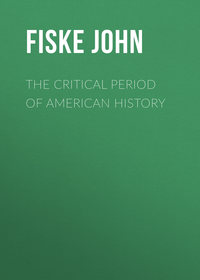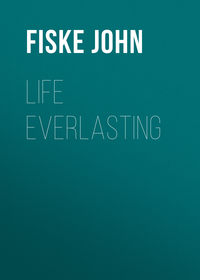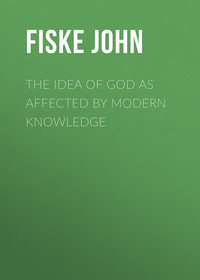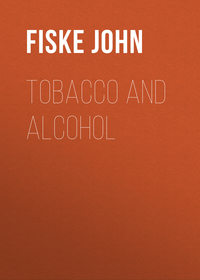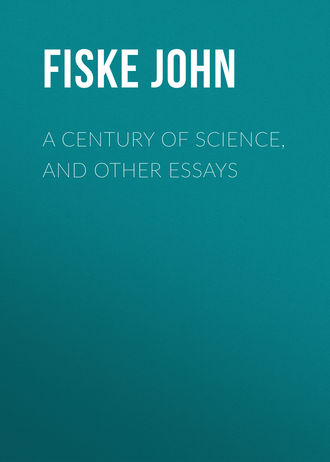 полная версия
полная версияA Century of Science, and Other Essays
As to the antiquity and the primitive character of Mr. Curtin's stories an experienced observer can entertain no doubt. His book is certainly the most considerable achievement in the field of Gaelic mythology since the publication, thirty years ago, of Campbell's "Tales of the West Highlands;" and it does for the folk-lore of Ireland what Asbjörnsen and Moe's collection (the English translation of which is commonly, and with some injustice, known by the name of the translator as Dasent's "Norse Tales") did for the folk-lore of Norway. This is, of course, very high praise, but we do not believe it will be called extravagant by any competent scholar who reads Mr. Curtin's book. The stories have evidently been reduced to writing with most scrupulous and loving fidelity. In turning the Gaelic into English some of the characteristic Hibernian phrases and constructions of our language have been employed, and this has been done with such perfect good taste that the effect upon the ear is like that of a refined and delicate brogue.
The mythical material in the stories is largely that with which the student of Aryan folk-lore is familiar. We have variants of Cinderella, the swan maidens, the giant who had no heart in his body, the cloak of darkness, the sword of light, the magic steed which overtakes the wind before and outstrips the wind behind; the pot of plenty, from which one may eat forever, and the cup that is never drained; the hero who performs impossible tasks, and wooes maidens whose beauty hardly relieves their treacherous cruelty: "I must tell you now that three hundred king's sons, lacking one, have come to ask for my daughter, and in the garden behind my castle are three hundred iron spikes, and every spike of them but one is covered with the head of a king's son who couldn't do what my daughter wanted of him, and I'm greatly in dread that your own head will be put on the one spike that is left uncovered." The princess in this story – Shaking-Head – is such a wretch, not a bit better than Queen Labe in the "Arabian Nights," that one marvels at the hero for marrying her at last, instead of slicing off her head with his two-handed sword of darkness, and placing it on the three-hundredth spike. But moral as well as physical probabilities are often overstrained in this deliciously riotous realm of folk-lore.
Along with much material that is common to the Aryan world there is some that is peculiar to Ireland, while the Irish atmosphere is over everything. The stories of Fin MacCumhail (pronounced MacCool) and the Fenians of Erin are full of grotesque incident and inimitable drollery. Fin and his redoubtable dog Bran, the one-eyed Gruagach, the hero Diarmuid, the old hag with the life-giving ointment, the weird hand of Mal MacMulcan, and the cowherd that was son of the king of Alban make a charming series of pictures. Among Fin's followers there is a certain Conán Maol, "who never had a good word in his mouth for any man," and for whom no man had a good word. This counterpart of Thersites, as Mr. Curtin tells us, figures as conspicuously in North American as in Aryan myths. Conán was always at Fin's side, and advising him to mischief. Once it had like to have gone hard with Conán. The Fenians had been inveigled into an enchanted castle, and could not rise from their chairs till two of Fin's sons had gone and beheaded three kings in the north of Erin, and put their blood into three goblets, and come back and rubbed the blood on the chairs. Conán had no chair, but was sitting on the floor, with his back to the wall, and just before they came to him the last drop of blood gave out. The Fenians were hurrying past without minding the mischief-maker, when, upon his earnest appeal, Diarmuid "took him by one hand, and Goll MacMornee by the other, and, pulling with all their might, tore him from the wall and the floor. But if they did, he left all the skin of his back, from his head to his heels, on the floor and the wall behind him. But when they were going home through the hills of Tralee, they found a sheep on the way, killed it, and clapped the skin on Conán. The sheepskin grew to his body; and he was so well and strong that they sheared him every year, and got wool enough from his back to make flannel and frieze for the Fenians of Erin ever after." This is a favourite incident, and recurs in the story of the laughing Gruagach. In most of the Fenian stories the fighting is brisk and incessant. It is quite a Donnybrook fair. Everybody kills everybody else, and then some toothless old woman comes along and rubs a magic salve on them, when, all in a minute, up they pop, and go at it again.
One of the quaintest conceits, and a pretty one withal, is that of Tir na n-Og, the Land of Youth, the life-giving region just beneath the ground, whence mysteriously spring the sturdy trees, the soft green grass, and the bright flowers. The journey thither is not long; sometimes the hero just pulls up a root and dives down through the hole into the blessed Tir na n-Og, – as primitive a bit of folk-lore as one could wish to find! A lovely country, of course, was that land of sprouting life, and some queer customs did they have there. The mode of "running for office" was especially worthy of mention. Once in seven years all the champions and best men "met at the front of the palace, and ran to the top of a hill two miles distant. On the top of that hill was a chair, and the man that sat first in the chair was king of Tir na n-Og for the next seven years." This method enabled them to dispense with nominating conventions and campaign lies, but not with intrigue and sorcery, as we find in the droll story of Oisin (or Ossian), which concludes the Fenian series.
The story of the Fisherman's Son and the Gruagach of Tricks is substantially the same with the famous story of Farmer Weathersky, in the Norse collection translated by Sir George Dasent. Gruagach (accented on the first syllable) means "the hairy one," and, as Mr. Curtin cautiously observes, "we are more likely to be justified in finding a solar agent concealed in the person of the laughing Gruagach or the Gruagach of Tricks than in many of the sun myths put forth by some modern writers." He reminds one of Hermes and of Proteus, and in the wonderful changes at the end of the story we have, as in Farmer Weathersky, a variant of the catastrophe in the story of the Second Royal Mendicant in the "Arabian Nights;" but the Irishman gives us a touch of humour that is quite his own. The Gruagach and his eleven artful sons are chasing the fisherman's son through water and air, and various forms of fish and bird are assumed, until at length the fisherman's son, in the shape of a swallow, hovers over the summerhouse where the daughter of the king of Erin is sitting. Weary with the chase, the swallow becomes a ring, and falls into the girl's lap; it takes her fancy, and she puts it on her finger. Then the twelve pursuers change from hawks into handsome men, and entertain the king in his castle with music and games, until he asks them what in the world he can give them. All they want, says the old Gruagach, is the ring which he once lost, and which is now on the princess's finger. Of course, says the king, if his daughter has got the ring, she must give it to its owner. But the ring, overhearing all this, speaks to the princess, and tells her what to do. She gets a gallon of wheat grains and three gallons of the strongest potheen that was ever brewed in Ireland, and she mixes them together in an open barrel before the fire. Then her father calls her and asks for the ring; and when she finds that her protests are of no avail, and she must give up, she throws it into the fire. "That moment the eleven brothers made eleven pairs of tongs of themselves; their father, the old Gruagach, was the twelfth pair. The twelve jumped into the fire to know in what spark of it would they find the old fisherman's son; and they were a long time working and searching through the fire, when out flew a spark, and into the barrel. The twelve made themselves men, turned over the barrel, and spilled the wheat on the floor. Then in a twinkling they were twelve cocks strutting around. They fell to, and picked away at the wheat, to know which one would find the fisherman's son. Soon one dropped on one side, and a second on the opposite side, until all twelve were lying drunk from the wheat."
One seems to see the gleam in the corner of the eye and the pucker in the Gaelic visage of the old narrator. To be sure, it was the wheat. It couldn't have been the mountain dew; it never is. Well, when things had come to this pass, the spark that was the fisherman's son just turned into a fox, and with one smart bite he took the head off the old Gruagach, and the eleven other boozy cocks he finished with eleven other bites. Then he made himself the handsomest man in Erin, and married the princess and succeeded to the crown.
There is a breezy freshness about these tales, which will make the book a welcome addition to young people's libraries. It is safe to predict for it an enviable success. In the next edition there ought to be an index, and we wish the author need not feel it necessary to be so sparing with his own notes and comments. His brief Introduction is so charming, from its weight of sense and beauty of expression, that one would gladly hear more from the author himself. It is to be hoped that the book lately published is the forerunner of many.
August, 1890.
XII
GUESSING AT HALF AND MULTIPLYING BY TWO
"The small philosopher is a great character in New England. His fundamental rule of logical procedure is to guess at the half and multiply by two. [Applause.]"31 It is [in 1880] only two or three years since the philosopher from whom this text is quoted was himself a great character in New England, inasmuch as he could give a lecture once every week, in one of the largest halls of New England's principal city, and could entertain his audience of two or three thousand people with discussions of the most vast and abstruse themes of science and metaphysics. The success with which he entertained his audience is carefully chronicled for us in the volumes made up from the reports of his lectures, in which parenthetical notes of "laughter," "applause," or "sensation" occur as frequently as in ordinary newspaper reports of stump speeches or humorous convivial harangues. As a social phenomenon this career of the Rev. Joseph Cook possesses considerable interest, – enough, at any rate, to justify a brief inquiry as to his "fundamental rule of procedure."
Among the wise and witty sayings of the ancients with which our children are puzzled and edified in the first dozen pages of the Greek Reader, there is a caustic remark attributed to Phokion, on the occasion of being very loudly applauded by the populace. "Dear me," said the old statesman, "can it be that I have been making a fool of myself?" So, when three thousand people are made to laugh and clap their hands over statements about the origin of species or the anatomy of the nervous system, the first impulse of any scientific inquirer of ordinary sagacity and experience is to ask in what meretricious fashion these sober topics can have been treated, in order to have produced such a result. The inference may be cynical, but is none the less likely to be sound. In the present case, one does not need to read far in the published reports of these lectures to see that the fundamental rule of procedure is something very different from any of the rules by which truth is wooed and won by scientific inquirers. Among Mill's comprehensive canons of logical method one might search in vain for a specimen of the method employed by Mr. Cook. Of the temper of mind, indeed, in which scientific inquiries are conducted, he has no more conception than Laura Bridgman could have of Pompeian red or a chord of the minor ninth. The process of holding one's judgment in suspense over a complicated problem, of patiently gathering and weighing the evidence on either side, of subjecting one's own first-formed hypotheses to repeated verification, of clearly comprehending and fairly stating opposing views, of setting forth one's conclusions at last, guardedly and with a distinct consciousness of the conditions under which they are tenable, – all this sort of thing is quite foreign to Mr. Cook's nature.
To him a scientific thesis is simply a statement over which it is possible to get up a fight. The gamecock is his totem; to him the bones of the vertebrate subkingdom are only so many bones of contention, and the sponge is interesting chiefly as an emblem which is never, on any account, to be thrown up. He talks accordingly of scientific men lying in wait for Mr. Darwin, ready to pounce on him like a tiger on its prey; he is very fond of exhibiting what he calls the "strategic point" of a scientific book or theory; and altogether his attitude is bellicose to a degree that is as unbecoming in a preacher of the gospel as it is out of place in a discussion of scientific questions. His favourite method of dealing with a scientific writer is to quote from him all sorts of detached statements and inferences, and, without the slightest regard to the writer's general system of opinions or habits of thought, to praise or vituperate the detached statements according to some principle which it is not always easy for the reader to discover, but which has always doubtless some reference to their supposed bearings upon the peculiar kind of orthodoxy of which Mr. Cook appears as the champion. There are some writers whom he thinks it necessary always to scold or vilify, no matter what they say. If they happen to say something which ought to be quite satisfactory to any reasonable person of "orthodox" opinions, Mr. Cook either accuses them of insincerity or represents them as making "concessions."
This last device, I am sorry to be obliged to add, is not an uncommon one with theological controversialists, when their zeal runs away with them. When a man makes a statement which expresses his deepest convictions, there is no easier way of seeming to knock away the platform on which he stands than to quote his statement, and describe it as something which he has reluctantly "conceded." In dealing with the principal writers on evolution, Mr. Cook is continually found resorting to this cheap device. For example, when Professor Tyndall declares that "if a right-hand spiral movement of the particles of the brain could be shown to occur in love, and a left-hand spiral movement in hate, we should be as far off as ever from understanding the connection of this physical motion with the spiritual manifestations," – when Professor Tyndall declares this, he simply asserts what is a cardinal proposition with the group of English philosophers to which he belongs. With Professor Huxley, as well as with Mr. Spencer, it is a fundamental proposition that psychical phenomena cannot possibly be interpreted in terms of matter and motion, and this proposition they have at various times set forth and defended. In the chapter on Matter and Spirit, in my work on "Cosmic Philosophy," I have fully expounded this point, and have further illustrated it in "The Unseen World." With the conclusions there set forth the remark of Professor Tyndall thoroughly agrees, and it does so because all these expressions of opinion and all these arguments are part and parcel of a coherent system of anti-materialistic thought adopted32 by the English school of evolutionists. Yet when Mr. Cook quotes Professor Tyndall's remark, he does it in this wise: "It is notorious that even Tyndall concedes," etc., etc.
By proceeding in this way, Mr. Cook finds it easy to make out a formidable array of what he calls "the concessions of evolutionists." He first gives the audience a crude impression of some sort of theory of evolution, such as no scientific thinker ever dreamed of; or, to speak more accurately, he plays upon the crude impression already half formed in the average mind of his audience, and which he evidently shares himself. The average notion of the doctrine of evolution, possessed in common by an audience big enough to fill Tremont Temple, would no doubt seem to Darwin or to Spencer something quite fearful and wonderful. Playing with this sort of crude material, Mr. Cook puts together a series of numbered propositions, which remind one of those interminable auction catalogues of Walt Whitman, which some of our British cousins, more ardent than discriminating, mistake for a truly American species of inspired verse. In this long catena of statements, almost everything is easily seen to disagree with the crude general impression to which the speaker appeals, and almost everything is accordingly set down as a "concession." And as the audience go out after the lecture, they doubtless ask one another, in amazed whispers, how it is that sensible men who make so many "concessions" can find it in their hearts to maintain the doctrine of evolution at all!
Sometimes Mr. Cook goes even farther than this, and, in the very act of quoting an author's declared opinions, expressly refuses to give him credit for them. Thus he has the hardihood to say: "Even Herbert Spencer, who would be very glad to prove the opposite,33 says, in his Biology, 'The proximate chemical principles or chemical units – albumen, fibrine, gelatine, or the hypothetical proteine substance – cannot possess the property of forming the endlessly varied structures of animal forms.'" Mr. Cook here lays claim to a knowledge of his author's innermost thoughts and wishes which is quite remarkable. For a fit parallel one would have to cite the instance of the German who flogged his son for profanity, though the boy had not opened his mouth. "You dinks tamn," exclaimed the irate father, "and I vips you for dat!"
As there are some writers whom Mr. Cook thinks it always necessary to vituperate, no matter what they say, so there are others whom he finds it convenient to quote, as foils to the former, and to mention with praise on all occasions, though it is difficult to assign the reasons for this preference, except on the hypothesis that the lecturer has an implicit faith in the simple and confiding nature of his audience. Before giving these lectures Mr. Cook had studied awhile in Germany, and his citations of German writers show how far he deems it safe to presume on New England's ignorance of what the Fatherland thinks. It is nice to have such a learned country as Germany at one's disposal to hurl at the heads of people whose "outlook in philosophy does not reach beyond the Straits of Dover;" it saves a great deal of troublesome argument, and still more painful examination of facts. This English opinion is all very well, you know, but it comes from a philosopher "whose star is just touching the western pines," and a German professor whom I am about to quote, whose book I "hold in my hand," and "whose star is in the ascendant," does not agree with it. All this is extremely neat and convincing, apparently, to the crowd in Tremont Temple. With all Germany at his disposal, however, it must be acknowledged that our lecturer makes a very sparing use of his resources. He quotes Helmholtz and Wundt every now and then with warm approval, though wherein they should be found any more acceptable to the orthodox world than Tyndall and Spencer it is not easy to see, save that the ill repute of German free thinkers takes somewhat longer to get diffused in New England than the ill repute of English free thinkers.
Then, among these Germans who are to set the English-speaking world aright we have Delitzsch! To speak of Wundt and Delitzsch is as if one were to bracket together John Stuart Mill and Frederick Denison Maurice. And then comes the admirable Lotze, whom Mr. Cook is continually setting off as a foil to Herbert Spencer. On page 179 of the lectures on "Heredity" he enumerates, with emphasis, those opinions of Lotze which he deems of especial importance with regard to the relations between matter and mind, and then proceeds to deprecate the "thunder" which he presumes he has evoked "from all quarters of the Spencerian sky." But, considering that the propositions he quotes from Lotze express the very views of Herbert Spencer, only somewhat inadequately worded, it would seem that the lecturer's alarm cannot be very real, and the thunder in question is only a kind of comic-opera thunder manufactured behind the curtain for the benefit of the acquiescent audience. For example, the fourth proposition quoted with approval from Lotze reads thus: "Physical phenomena point to an underlying being to which they belong, but do not determine whether that being is material or immaterial." Now this is Spencerism, pure and simple, and it is a crucial proposition, too, pointing out the drift of the whole philosophy before which it is set up. The fact that Mr. Cook adopts such an opinion when stated by Lotze, but vituperates the same opinion when stated by Spencer, reveals to us, with a pungent though not wholly delicious flavour, the "true inwardness" of his fundamental method of procedure.
That method, it must be acknowledged with due regard to the bon mot of the old Greek statesman, is a method well adapted to conciliate the favour of an immense audience, – even in Boston. We are all descended from fighting ancestors, and many of us, who care little for the disinterested discussion of scientific theories, still like to see a man knocked down or impaled, provided the knocking down be done with a syllogistic club, or the impaling be restricted to such a hard substance as is afforded by the horns of a dilemma. It satisfies our combative instincts, without shocking our physical sympathies or making any great demand on our keener thinking powers, which most people do most of all dislike to be called upon to exercise. To this kind of feeling Mr. Cook's lectures appeal, and the peculiar character of his success seems to show that he knows well how to deal with it. In a moment of winning frankness he exclaims: "Do you suppose that I think that this audience can be cheated? I do not know where in America there is another weekly audience with as many brains in it; at least, I do not know where in New England I should be so likely to be tripped up, if I were to make an incorrect statement, as here."34 After this coaxing little dose, Mr. Cook proceeds to show his respect for the learning of his audience in some remarks on bathybius, which, as he condescendingly explains, is a name derived from two Greek words, meaning deep and sea!! The profound knowledge of Greek thus exhibited is quite equalled by his account of bathybius from the zoölogical point of view. He begins by telling his hearers that, in a paper published in the "Microscopical Journal" in 1868, Professor Huxley "announced his belief that the gelatinous substance found in the ooze of the beds of the deep seas is a sheet of living matter extending around the globe." Furthermore, of "this amazingly strategic [!!] and haughtily trumpeted substance … Huxley assumed that it was in the past, and would be in the future, the progenitor of all the life on the planet." Now it is not true that, in the paper referred to, Huxley announces any such belief or makes any such assumption as is here ascribed to him; but we shall see, in a moment, that Mr. Cook's system of quotation is peculiar in enabling him to extract from the text of an author any meaning whatever that may happen to suit his purposes. This ingenious garbling enables the lecturer to come in with telling effect at the close of his third lecture, and earn an ignoble round of applause by holding up the current number of the "American Journal of Science and Arts" (which he would appear to have picked up at a bookstall on his way to the lecture room) and citing from it, as the fifty-first and closing "concession" of evolutionists, "that bathybius has been discovered in 1875, by the ship Challenger, to be – hear, O heavens! and give ear, O earth! – sulphate of lime; and that when dissolved it crystallizes as gypsum. [Applause.]" This is what Mr. Cook calls striking, with the "latest scientific intelligence," at the "bottom stem" of the great tree of evolution. The "latest scientific intelligence," with him, means the last book or article which he has glanced over without comprehending its import, but from which he has contrived to glean some statement calculated to edify his audience and scatter the hosts of Midian. In point of fact, the identification of bathybius with sulphate of lime was set down by Sir Wyville Thomson only as a suspicion, to which Huxley, like a true man of science, at once accorded all possible weight, while leaving the question open for further discussion. Only a mountebank, dealing with an audience upon whose ignorance of the subject he might safely rely, could pretend to suppose that the fate of the doctrine of evolution was in any way involved in the question as to the organic nature of bathybius. The amazing strategy was all Mr. Cook's own, and the haughty trumpeting appears to have been chiefly done with his own very brazen instrument.


